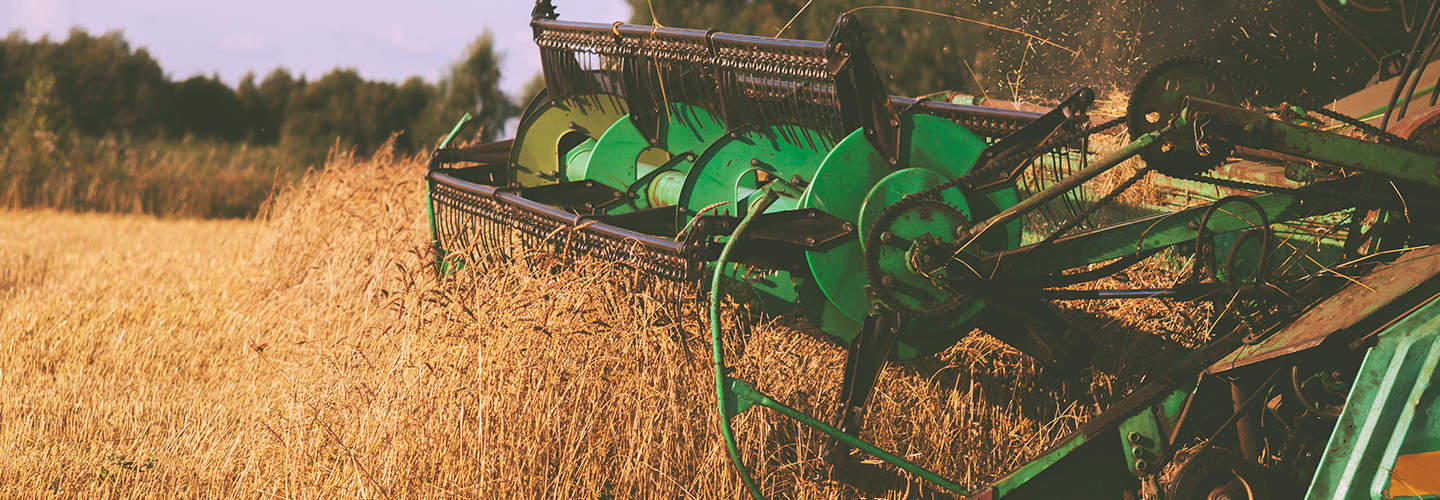Only One Customer? No Problem

As with businesses everywhere, the laws of supply and demand govern how most farms operate. Farmers grow their crops in hopes of selling to the highest bidder, even as they hedge their planting bets in the spring through futures contracts and crop insurance designed to maximize profits in the fall.
But there’s a whole segment of the agriculture industry that plows a different field, preferring to maintain a cozy relationship with a single customer, or just a few. Maybe they could get somewhat higher prices for their crops on the open market, but they prefer the security of knowing that their harvest is already accounted for.
That’s the strategy that lies behind the success of the Peterson family’s farming enterprise. Thanks to decades of close and trusting relationships with local distillers, particularly nearby Maker’s Mark Distillery, producers of the popular Maker’s Mark® bourbon, Peterson Farms achieves a double-digit return on equity in most years.
Of course, this approach doesn’t work out for every farm that caters to just one customer, but the Petersons’ story shows how, when it’s done right, being a single-source supplier can be a winning strategy for both sides of the supply-and-demand equation.
Making a mark
The Petersons have been farming since the time of the American Revolution; now, core members of the family own or lease more than 15,000 acres in central Kentucky. They provide Maker’s Mark with all of its wheat and a large amount of its corn, putting Peterson Farms at the center of the whiskey market in Kentucky, where bourbon was born and 95 percent of the world’s bourbon is produced.
“The biggest advantage we have is that we’re right here,” says Bernard Peterson, speaking of his hometown of Loretto, a rural village of fewer than 1,000 people, where Maker’s Mark is headquartered and is the largest employer. “The grain business is like that all over the world,” notes the 55-year-old, who runs the farm’s day-to-day operations. “If you have it to offer in the right place, you have a marketing advantage over someone who isn’t your neighbor.”
The Petersons’ experience with Maker’s Mark has been mostly smooth sailing, more like a partnership than a simple arrangement between buyers and sellers. Since the two businesses are neighbors, they collaborate closely, believing that each can gain from the other’s success, with none of the rancor and suspicion that can poison a buyer-supplier relationship. And the entire community benefits as well. “It’s easier to build a relationship with people you know and go to church with,” says Bernard. “You tend to sort out issues cooperatively in a businesslike way because hard feelings are personal.”

In practice, this translates into monthly meetings between teams from Peterson and Maker’s Mark to discuss crop quality issues, any news that may affect future orders, and ideas for improvement. Problems or concerns are addressed and fixed immediately, and expectations going forward are set.
The meetings are taken up largely with quality metrics, assessing performance to date and ensuring that strict standards are met—a crucial consideration for Maker’s Mark, which has used the same recipe and yeast strain for more than 65 years. “Maker’s Mark demands a high-quality crop or they can’t use it,” Peterson says. “So we take measures in our production system that help ensure that we are constantly producing the highest-quality grain we can.”
For instance, when it’s a toss-up whether to use fungicide to deal with aflatoxins or vomitoxins, among other pests, the Petersons are likely to apply it to safeguard grain production. And they typically harvest the crop a little earlier than they would for other customers, drying it in separate facilities on the farm rather than letting it dry in the field, where its quality may degrade. “Having to meet the needs of a very particular customer has led to better efficiency, productivity, and output on our farm because we have to be conscious of production and quality requirements that leave little room for mistakes,” Peterson says.
These requirements also have encouraged Peterson Farms to keep modernizing their operations. Maker’s Mark has only 40 hours of grain storage capacity onsite, so Peterson must deliver wheat daily to the distillery. To meet that goal, as well as orders from six other Kentucky distilleries, Peterson has developed a state-of-the-art grain storage system that can hold 2 million bushels in high-tech bins that continually assess and categorize crop quality in separate facilities for GMO corn and soybeans and for non-GMO crops like wheat. These crop storage and appraisal capabilities give the Petersons valuable go-to-market options, allowing them to delay deliveries to fulfill a futures contract that offers higher returns than a current contract (a so-called catch carry strategy) and to decide whether a market-priced or multiyear contract is better.
Ups and downs
For many farmers like the Petersons, there are several advantages in earmarking most of their crop for one or at most a few consumer goods producers. A steady customer typically means a consistent revenue stream and less uncertainty in planning for equipment purchases or future expansion. These agreements often involve much-needed investments by the food company in their farm partners, seeking to improve productivity or implement new and potentially expensive techniques involving, say, organic agriculture. And large food companies will sometimes recommend their most reliable suppliers to smaller manufacturers with whom they have relationships, providing yet another opportunity for farms to expand operations.

These agreements often involve much-needed investments by the food company in their farm partners, seeking to improve productivity or implement new and potentially expensive techniques.
In 2018, for instance, Kraft Heinz initiated a program to expand tomato production in Venezuela by some 400 percent, a tall order in the midst of the political and economic upheaval now disrupting that country. To do so, Heinz sold 17 million seeds to its Venezuelan suppliers at a reduced price, with the promise to purchase the output at market rates. The plan allowed Venezuelan farmers to plant crops they couldn’t afford to grow otherwise, and it gave Heinz a steady source of tomatoes and confidence in the quality of the seeds that produced the high-quality fruit it needed.
Back in the U.S., General Mills recently funded the conversion of the 34,000-acre Gunsmoke Farms in South Dakota into a certified organic farm to grow wheat for its Annie’s brand of pasta. As part of the deal, General Mills will cover the cost of training Gunsmoke Farms operators in regenerative soil management practices such as no-till, crop rotation, and cover cropping.
While collaborations between food companies and farms would appear to be a win-win, relying on a single buyer doesn’t always work out for farmers. One problem that arises is that in some cases corporations may make unreasonable demands and impose bad decisions about output and growing techniques without consulting the farmers themselves.
Grow and diversify
Meanwhile, the Petersons have only prospered from their close ties to Maker’s Mark. In the past decade, the family has doubled its acreage to more than 400 fields in seven Kentucky counties spanning more than 90 miles, and has diversified its customer base. A widening revenue stream comes from non-GMO soybeans shipped to Japan and Korea. This expansion has coincided with big investments in new technology. Every machine on the farm is equipped with GPS systems that are linked to inventory management programs on smartphones that produce yield maps and track seed, chemical, and fertilizer requirements and inputs on a real-time basis. Other software manages logistics for a dozen grain trucks and trailers.
By growing and modernizing in this way, Peterson, who is especially proud of his family’s ability to keep the farm operating through thick and thin for so many years, has been able to create a financial safety net that could keep the farm from hitting rock bottom if the distillery market goes south. Which has happened over the years, Peterson says: “Maker’s Mark’s production level ebbs and flows, like any other company. The good thing is that in today’s world, the distilling industry from one side to the other is in a growth phase.”
Or, as Peterson describes how the family views its approach to farming: “A rising tide lifts all boats.”